Illustrator/"Graphic Designer" | Avid overthinker | Appreciator of anything pretty and/or obscure
Don't wanna be here? Send us removal request.
Text





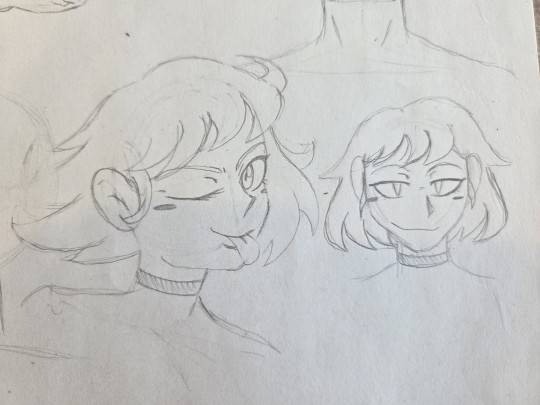


Series of varying sketches, all taken from my "sketchbook"
As of late, I've been making more vent-y art (on top of fandom stuff and general practice) in my "sketchbook", which is actually just a series of smaller ones I brought from the dollar store, then proceeded to tear the pages out of because I hate drawing on stacked paper-- I prefer thinner surfaces.
I think I like a lot of what I've produced, even if much of it was done on the fly and fueled exclusively by loud, uncontrollable feelings I often can't get a grip on.
...oh, and the fifth image was a cover for a zine I did at friend's workshop that I worked on for way too long.
#my art#my feelings#sketchbook#shenanigans#lots of floaty anime nonsense#cartoony gore that probably doesn’t look convincing enough to actually concern anyone until you actually think about what you're looking at#klonoa: prince of insomnia
0 notes
Note
Funny how you're both speaking from 'official' positions when that's just been my MO for the last few years.
How do you feel about the fact that as a big artist with a lot of fans, you cant engage with fandom spaces and such the same way anymore? Or is there no problem?
Eh I’m pretty lowkey now anyways. I learned pretty early that putting my opinions out there would usually start discourse (in that anything I said would blow up and usually leave my circle pretty easily) and it would stress me out. At first I felt like I was tiptoeing but after a bit I was just kinda like,,, well who cares. No one needs to know my opinions on anything anyways. Any fandom hot take I have, I’ll usually reserve for my friends. I feel like I’m good at picking my battles nowadays hahaha. I’ve kinda adopted a “post and leave” approach over the years and it’s done wonders for my mental health
I just do my thing and hope that people enjoy what I have to show~
2K notes
·
View notes
Text
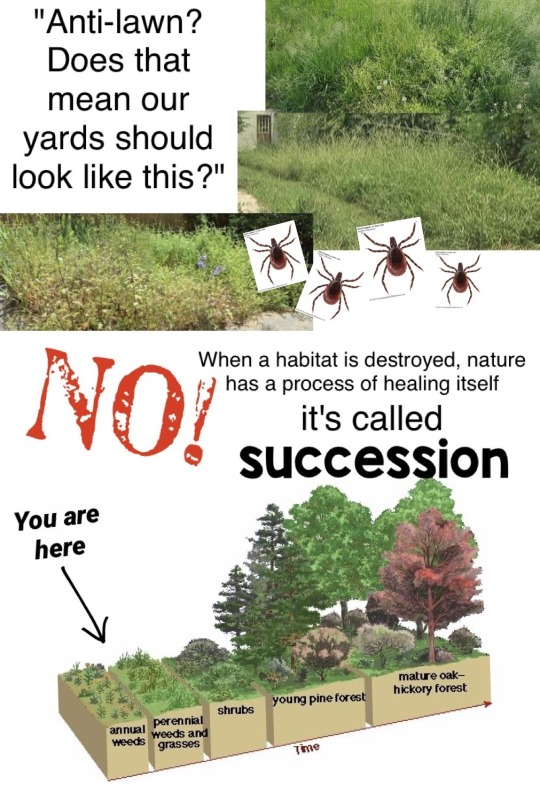
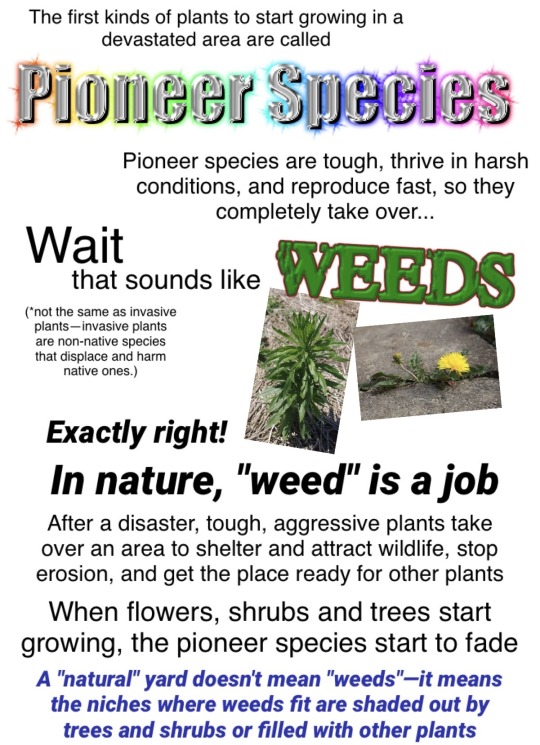
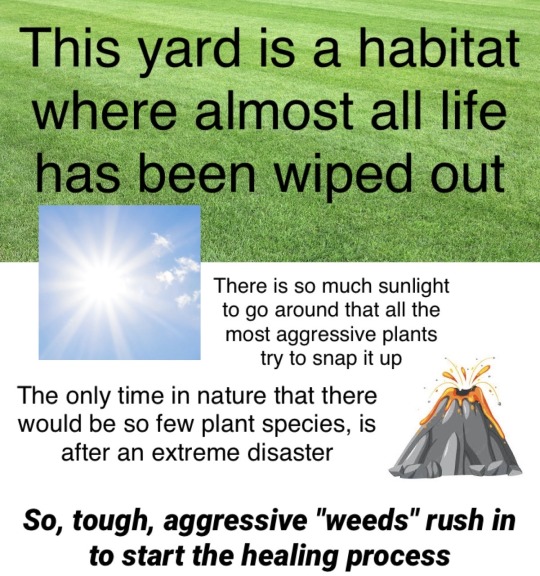
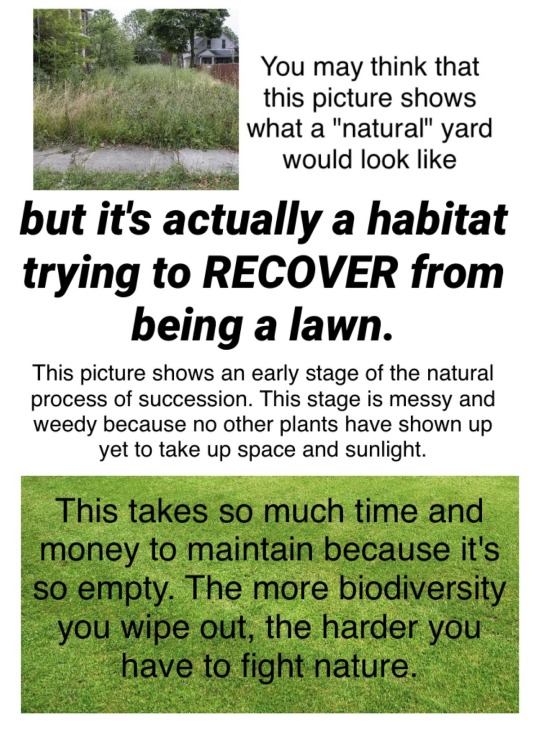
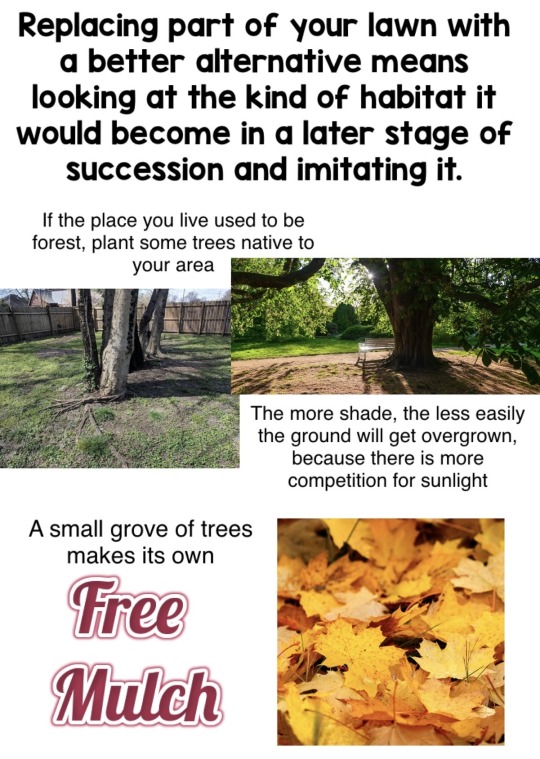
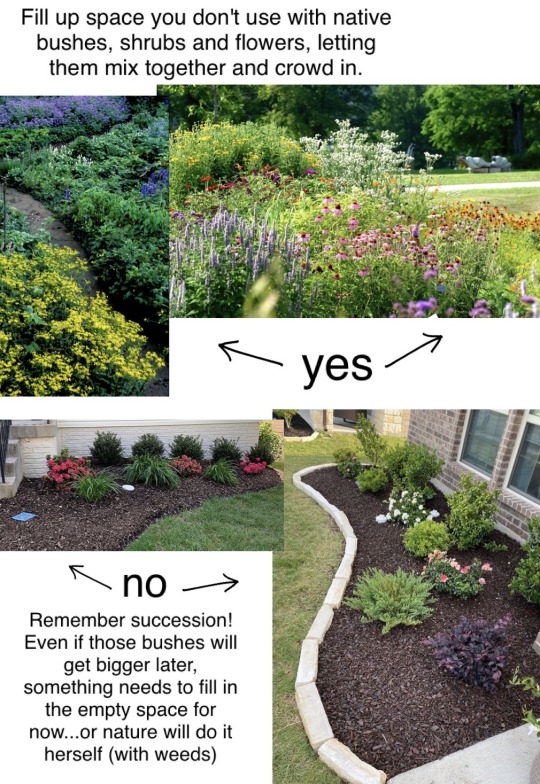
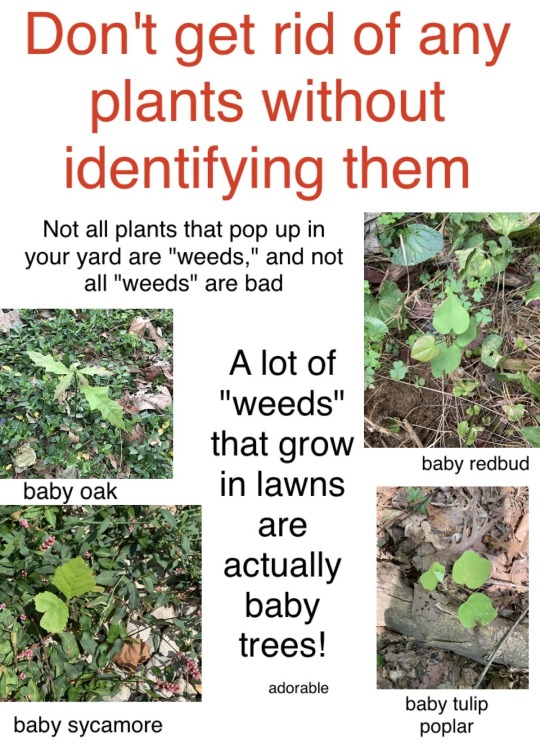
I...tried to make a meme and got carried away and made A Thing that is like partially unfinished because i spent like 3 hours on it and then got tired.
I think this is mostly scientifically accurate but truth be told, there seems to be relatively little research on succession in regards to lawns specifically (as opposed to like, pastures). I am not exaggerating how bad they are for biodiversity though—recent research has referred to them as "ecological deserts."
Feel free to repost, no need for credit
214K notes
·
View notes
Text
Oh-kay, logging back onto Tumblr for the first time in nearly a year, hopping onto an artist's profile and seeing/reading an in-depth post about how to conduct research for writing that's actually quite useful wasn't at all on my agenda today, but there it is.
WQA’s Guide to Internet Research
One thing I hear a lot here at WQA is, “I Googled such and such topic and I didn’t find anything.” Regardless of what the topic is, I know that’s not true because there’s a ton of information about every topic imaginable on the internet, all of it accessible via a simple Google search. So what’s happening here? Simple: people aren’t sure what they’re looking for, don’t know how to find what they need, or they’re overwhelmed by the pages and pages of results. But, honestly, researching your topic via the internet isn’t that difficult. Here’s what you need to do…
1) Know what you’re looking for.
The first thing you need to do is create a small summary of exactly how your topic fits into your story. For example, “My story is about a woman who survives a laboratory accident, but she becomes permanently blind due to eye trauma experienced in the accident. Now she must learn how to cope with losing her eyesight and learn how to navigate her world without it.”
2) Break it down into sub-topics.
Now that you have your topic sorted out, break it down into sub-topics that will make the research easier to do. In the above summary, there are three obvious phases of this woman’s situation. There was the initial trauma where the eyesight is lost, there’s coping with learning that her eyesight is lost, and there’s learning how to live without her eyesight. So, the sub-topics would be:
- losing eyesight due to trauma
- coping with lost eyesight
- learning to live with lost eyesight
3) Identify keywords, key phrases, and key questions.
The next thing you want to do is boil your topic summary and sub-topics down to keywords, key phrases, and questions that will help you find information. Start by underlining the important things in your summary:
My story is about a woman who survives a laboratory accident, but she becomes permanently blind due to eye trauma experienced in the accident. Now she must learn how to cope with losing her eyesight and learn how to navigate her world without it.
Keywords:
Blind/blindness eye trauma eyesight loss Key Phrases:
Coping with loss of eyesight Living with blindness Key Questions:
How do people learn to live with blindness? What happens when someone becomes blind? What is it like to permanently lose eyesight? What is it like to be blind? How do you adjust to being blind?
4) Go to Google and search.
Go to Google and type in your keywords, key phrases, and key questions. Not all at once, obviously, but one at a time. It works best if you tackle one sub-topic at a time. Sift through the first few pages of results and use “right-click, open in new tab” to open the most promising links.
Keyword: blindness (click here for example)
Keyphrase: living with blindness (click here for example)
Key question: What is it like to be blind? (click here for example)
5) Sift through the results.
Here are some of the results for “what is it like to be blind?”
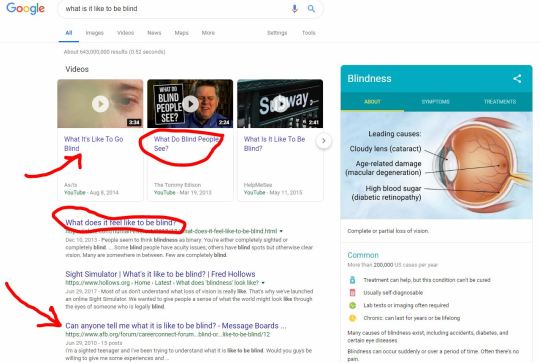
Just on the first half of the first page there are already resources that would be very handy, including videos, an in-depth article, medical information, and a forum thread which may have some firsthand experience.
6) Read, watch, and take notes.
Now it’s time for the hard work. You need to go through the most promising results, read through them, watch the videos, and take notes. Remember to focus on one sub-topic at a time. You may want to get a multi-subject spiral notebook with folder dividers, which will allow you to organize your notes by sub-topic, and if you want, you can print out any interesting articles and highlight the important details. Be sure to take notes while watching videos, too. You may want to create a folder in your browser where you can bookmark articles/sites/videos you’ll want to refer back to.
7) Resources to look for…
Articles - online newspapers, magazines, and news sites often post in-depth articles about a variety of topics. These articles often boil topics down to their most important elements. Sometimes they zero in on specific points of a topic, which can be really helpful when doing research.
Reference Sites - there are lots of different online references that cover a variety of topics. Encyclopedias, like the Encyclopedia Britannica, are available online. There are also wikis like Wikipedia, and topic specific wikis like TV Tropes and recipe wiki. Educational Sites - lots of topics, especially those having to do with health, lifestyle, and medical issues, have web sites dedicated to educating the public about that topic/issue. For example, the American Heart Association has a site dedicated to teaching people about heart disease and heart health.
Enthusiast Sites - sometimes, enthusiasts of a particular topic will put together a whole website dedicated to delivering information about that topic.
Blogs - blogs dedicated to a particular topic can be an incredible resource. For example, if you’re writing about a character who is living on their own for the first time, I guarantee you can find blogs written by people who are living on their own for the first time, all about their experiences and the ups and downs.
Forums - forums are another great place to find information. Not only are there forums dedicated to just about every topic imaginable, but if you have a question about that topic, odds are good someone has had a similar question and asked it. When you can find a forum dedicated to your topic, you can do a search there on your keywords or your specific question and see if someone already posted about it.
Videos - YouTube, Vimeo, MetaCafe and others offer videos on every topic imaginable. Sometimes you can find actual documentaries on your subject. Other times you can find overview videos. You can also find panels, exposes, lectures, and other videos about various topics.
Google Maps and Google Earth - if your topic relates to a place, viewing it in Google Maps or Google Earth can give you lots of interesting information. Not only can you get a street view of the location, but you can also get pictures and other important information. Some places like museums and historical sites even have online walk-throughs.
Online Exhibits - if your topic is something related to arts, science, or industry, there’s a good chance you can find an online exhibit relating to your topic via a museum online. For example, the fashion and textile museum has a digital collection you can look through. The Dittrick Museum of Medical History has several online exhibits an photo collections.
Digital Books and Magazines - sometimes you can find digital books and magazines dedicated to your topic. For example, if you’re writing about an 1800s whaling captain, you may be able to find digitized books about whaling, sailing, and life in the 1800s.
8) Other places to look.
Although this post is about doing internet research, remember that there are other places to look for information about your topic. Here are some to keep in mind:
The Library - whether it’s your school library or your local library, libraries are still one of the best places you can go to get information about any topic. Not only are the chalk full of books, references, and other resources, they’re staffed with knowledgeable people who are trained to help you find the information you need. Even if you plan to research your topic online, don’t hesitate to stop in your local library for supplemental information. Librarians want to help you! That’s what they’re there for!
People - the people in your life have had a variety of different experiences and learned all different things. Look for people in your life who might have firsthand information about a particular topic. For example, maybe your friend’s grandfather is blind. Perhaps you could ask for an interview, or talk to her family members about what they know about his experience.
Books - obvious, I know, but you’d be surprised how rarely people think of finding books about their topic. The library is obviously a good place to start, but sometimes you can find pertinent information in books already on your shelves. If not, see what’s available on Amazon. Sometimes you can get used copies at a reduced price. Or, go see what’s available at your local bookstore.
TV Shows and Movies - while you should certainly never assume something you see on TV or in a movie is real or accurate, they can still be a great place to go to get a general overview about a particular topic. Watching a movie about a blind person can give you insight that will help make your research a little easier, because the topic will be more familiar to you.
Museums, Historic Sites, and Other Locations - if you can learn more about your topic by visiting a place, and if you can get to that place, go! If you’re writing about a noble woman who lives in a big manor house, nothing beats visiting an actual manor house for an idea of what that might be like. Even if the manor house (mansion, estate, etc.) you have access to isn’t quite like the one you’re writing about, just being there can still give you vital details that will help make your story more authentic.Or, your museum might have an exhibit on furniture from the Edwardian era. Getting a look at all that fancy furniture will help you recreate those details in your story’s manor house.
The most important thing of all is to not get frustrated. Take the time, do the work, and research can be the most rewarding part of writing your story! :)
3K notes
·
View notes
Text
WQA’s Guide to Internet Research
One thing I hear a lot here at WQA is, “I Googled such and such topic and I didn’t find anything.” Regardless of what the topic is, I know that’s not true because there’s a ton of information about every topic imaginable on the internet, all of it accessible via a simple Google search. So what’s happening here? Simple: people aren’t sure what they’re looking for, don’t know how to find what they need, or they’re overwhelmed by the pages and pages of results. But, honestly, researching your topic via the internet isn’t that difficult. Here’s what you need to do…
1) Know what you’re looking for.
The first thing you need to do is create a small summary of exactly how your topic fits into your story. For example, “My story is about a woman who survives a laboratory accident, but she becomes permanently blind due to eye trauma experienced in the accident. Now she must learn how to cope with losing her eyesight and learn how to navigate her world without it.”
2) Break it down into sub-topics.
Now that you have your topic sorted out, break it down into sub-topics that will make the research easier to do. In the above summary, there are three obvious phases of this woman’s situation. There was the initial trauma where the eyesight is lost, there’s coping with learning that her eyesight is lost, and there’s learning how to live without her eyesight. So, the sub-topics would be:
- losing eyesight due to trauma
- coping with lost eyesight
- learning to live with lost eyesight
3) Identify keywords, key phrases, and key questions.
The next thing you want to do is boil your topic summary and sub-topics down to keywords, key phrases, and questions that will help you find information. Start by underlining the important things in your summary:
My story is about a woman who survives a laboratory accident, but she becomes permanently blind due to eye trauma experienced in the accident. Now she must learn how to cope with losing her eyesight and learn how to navigate her world without it.
Keywords:
Blind/blindness eye trauma eyesight loss Key Phrases:
Coping with loss of eyesight Living with blindness Key Questions:
How do people learn to live with blindness? What happens when someone becomes blind? What is it like to permanently lose eyesight? What is it like to be blind? How do you adjust to being blind?
4) Go to Google and search.
Go to Google and type in your keywords, key phrases, and key questions. Not all at once, obviously, but one at a time. It works best if you tackle one sub-topic at a time. Sift through the first few pages of results and use “right-click, open in new tab” to open the most promising links.
Keyword: blindness (click here for example)
Keyphrase: living with blindness (click here for example)
Key question: What is it like to be blind? (click here for example)
5) Sift through the results.
Here are some of the results for “what is it like to be blind?”

Just on the first half of the first page there are already resources that would be very handy, including videos, an in-depth article, medical information, and a forum thread which may have some firsthand experience.
6) Read, watch, and take notes.
Now it’s time for the hard work. You need to go through the most promising results, read through them, watch the videos, and take notes. Remember to focus on one sub-topic at a time. You may want to get a multi-subject spiral notebook with folder dividers, which will allow you to organize your notes by sub-topic, and if you want, you can print out any interesting articles and highlight the important details. Be sure to take notes while watching videos, too. You may want to create a folder in your browser where you can bookmark articles/sites/videos you’ll want to refer back to.
7) Resources to look for…
Articles - online newspapers, magazines, and news sites often post in-depth articles about a variety of topics. These articles often boil topics down to their most important elements. Sometimes they zero in on specific points of a topic, which can be really helpful when doing research.
Reference Sites - there are lots of different online references that cover a variety of topics. Encyclopedias, like the Encyclopedia Britannica, are available online. There are also wikis like Wikipedia, and topic specific wikis like TV Tropes and recipe wiki. Educational Sites - lots of topics, especially those having to do with health, lifestyle, and medical issues, have web sites dedicated to educating the public about that topic/issue. For example, the American Heart Association has a site dedicated to teaching people about heart disease and heart health.
Enthusiast Sites - sometimes, enthusiasts of a particular topic will put together a whole website dedicated to delivering information about that topic.
Blogs - blogs dedicated to a particular topic can be an incredible resource. For example, if you’re writing about a character who is living on their own for the first time, I guarantee you can find blogs written by people who are living on their own for the first time, all about their experiences and the ups and downs.
Forums - forums are another great place to find information. Not only are there forums dedicated to just about every topic imaginable, but if you have a question about that topic, odds are good someone has had a similar question and asked it. When you can find a forum dedicated to your topic, you can do a search there on your keywords or your specific question and see if someone already posted about it.
Videos - YouTube, Vimeo, MetaCafe and others offer videos on every topic imaginable. Sometimes you can find actual documentaries on your subject. Other times you can find overview videos. You can also find panels, exposes, lectures, and other videos about various topics.
Google Maps and Google Earth - if your topic relates to a place, viewing it in Google Maps or Google Earth can give you lots of interesting information. Not only can you get a street view of the location, but you can also get pictures and other important information. Some places like museums and historical sites even have online walk-throughs.
Online Exhibits - if your topic is something related to arts, science, or industry, there’s a good chance you can find an online exhibit relating to your topic via a museum online. For example, the fashion and textile museum has a digital collection you can look through. The Dittrick Museum of Medical History has several online exhibits an photo collections.
Digital Books and Magazines - sometimes you can find digital books and magazines dedicated to your topic. For example, if you’re writing about an 1800s whaling captain, you may be able to find digitized books about whaling, sailing, and life in the 1800s.
8) Other places to look.
Although this post is about doing internet research, remember that there are other places to look for information about your topic. Here are some to keep in mind:
The Library - whether it’s your school library or your local library, libraries are still one of the best places you can go to get information about any topic. Not only are the chalk full of books, references, and other resources, they’re staffed with knowledgeable people who are trained to help you find the information you need. Even if you plan to research your topic online, don’t hesitate to stop in your local library for supplemental information. Librarians want to help you! That’s what they’re there for!
People - the people in your life have had a variety of different experiences and learned all different things. Look for people in your life who might have firsthand information about a particular topic. For example, maybe your friend’s grandfather is blind. Perhaps you could ask for an interview, or talk to her family members about what they know about his experience.
Books - obvious, I know, but you’d be surprised how rarely people think of finding books about their topic. The library is obviously a good place to start, but sometimes you can find pertinent information in books already on your shelves. If not, see what’s available on Amazon. Sometimes you can get used copies at a reduced price. Or, go see what’s available at your local bookstore.
TV Shows and Movies - while you should certainly never assume something you see on TV or in a movie is real or accurate, they can still be a great place to go to get a general overview about a particular topic. Watching a movie about a blind person can give you insight that will help make your research a little easier, because the topic will be more familiar to you.
Museums, Historic Sites, and Other Locations - if you can learn more about your topic by visiting a place, and if you can get to that place, go! If you’re writing about a noble woman who lives in a big manor house, nothing beats visiting an actual manor house for an idea of what that might be like. Even if the manor house (mansion, estate, etc.) you have access to isn’t quite like the one you’re writing about, just being there can still give you vital details that will help make your story more authentic.Or, your museum might have an exhibit on furniture from the Edwardian era. Getting a look at all that fancy furniture will help you recreate those details in your story’s manor house.
The most important thing of all is to not get frustrated. Take the time, do the work, and research can be the most rewarding part of writing your story! :)
3K notes
·
View notes
Text


So, since I last posted here, a friend of mine introduced me to Ranma 1/2 and it permanently altered my brain chemistry forever.
...now I'm hopelessly hooked onto this and Takahashi's other works, namely Maison Ikkoku and POSSIBLY Urusei Yatsura. Help.
[Akane was a commission and I did Nabiki on my own since she's my favorite of the Tendo sisters.]
I've also made other things since the fact, but I wanted to start my sudden reintriduction with this.
39 notes
·
View notes
Text

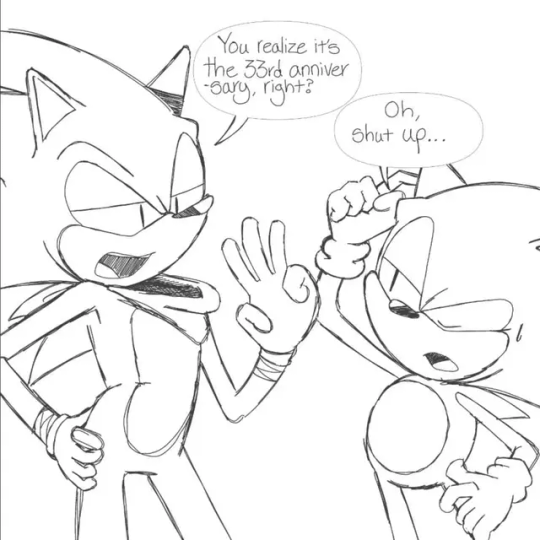
Happy birthday, Sonic!
I hate you immensely...
5 notes
·
View notes
Text
Been going down a drawpile I set up for myself a few days back.
Here are the results.



8 notes
·
View notes
Text



Haha, yeah...
Uh, hey everyone. It's been a minute yet again.
Still drawing stuff, though...
26 notes
·
View notes
Text
An unexpected revival!
Yes, the account is suddenly alive again! Thank my brain suddenly remembering that this was a thing. As you can tell, Prince of Insomnia got absolutely nowhere. I kind of have a bad habit of not finishing big things like this.
But hey. I have been doing other things in and out when school isn't bothering me, so have some of that. My Klonoa obsession has faded and a certain bean-shaped bomber has taken his place:




...meet the Bomberman Channel! Think Sonic Channel, but Bomberman. It's got a YouTube channel and maybe website, which I'll be linking here:
• YouTube: https://youtube.com/channel/UCJHJ-IWbj1jf90iGOWDHthQ
• Website: [Work in progress]
Otherwise, expect a big ol' art dump in the coming days.
#bomberman#hudson soft#konami#super bomberman r#super bomberman r online#bomberman channel#bomberman max#super bomberman 4#bomberman shitennou
13 notes
·
View notes
Text
Soon.
...but not really, oops.

10 notes
·
View notes
Text
Prince of Insomnia: Update #01
Hello there, everyone!
I want to reassure you all that work is legitimately underway now for this comic series. I want to apologize for all the silence these past few months. If not for the bouts procrastination, then it's stuff like school that's seriously gotten in the way of all this. While I can't absolutely guarantee that things will really get off the ground too soon, do know that it's all no longer talk and mere pictures.
That said, have the cover to the first issue and series logo. I appreciate your patience throughout all this.


9 notes
·
View notes
Text

Enter Klonoa: Prince of Insomnia!
I have some bad news, firstly. In a bad rainstorm, the folder containing Klonoa Adventure #1 got totally soaked. This, alongside a few other things, has inspired me to restart this project once more.
And with this comes a bunch of new things. Firstly, Klonoa now has a more refined outfit. For as much as I may have liked the original, it was a bit confusing to draw, and often came out inconsistent. Secondly, the narrative is being changed in parts here and there. This, you'll likely see as we go on. Finally, and as always, I'll be trying my damndest to get things rolling sooner than later. Expect updates here first as always.
#klonoa#namco#namcobandai#klonoa 2: lunatea's veil#klonoa: door to phantomile#klonoa: prince of insomnia
6 notes
·
View notes
Text

Decided to draw best girl, Leorina, for whatever reason.
Don't worry. Work on part 2 of Klonoa Adventure issue 1 is very much still underway.



Here's proof.
Anyway, if you'd ever like to chat one up with me outside of here, just hit me up on Discord and I'll invite you to my server.
12 notes
·
View notes
Text






Yo!
I've been doing some OTHER stuff on my tablet as of late, still trying to get used to everything (as well as find the right software for me), and a NOT AT ALL SNEAK PEEK OF Klonoa Adventure #1: Part 2.
Nope. No way. No sir. No how.
16 notes
·
View notes
Text
Got my hands on the Microsoft Surface 3 and it's accompanying pen recently, and I must say that it's pretty damn neat. My only gripe is that I now have to get used to PURELY digital art.




But I guess I'm coming along pretty okay. For context, I was previously drawing on my 3ds XL via Colors3d.
2 notes
·
View notes
